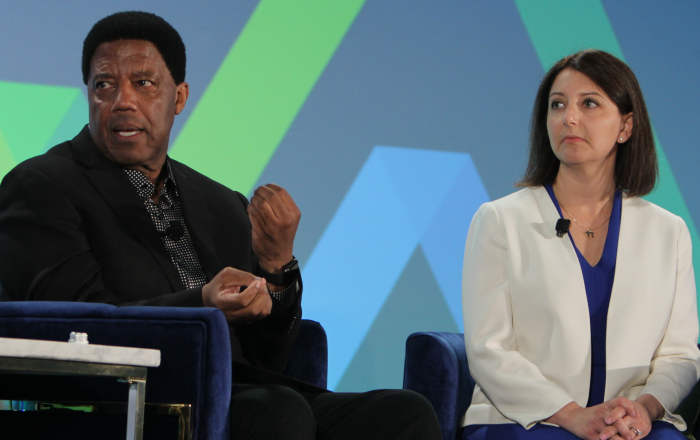When Mandy Cohen, MD, Secretary of the North Carolina Department of Health and Human Services, was a young resident, she saw a 24-year-old patient, commercially insured, who was losing weight and even losing her hair.
“I did what doctors do—I ordered a lot of lab tests” Cohen said during a main stage discussion at the Health Evolution Summit called “Upstream Investments for Downstream Health.” They all came back negative. A few weeks later the patient came back looking extremely ill, and Cohen pondered which specialist she might need to see next. A nurse quietly suggested that Cohen ask the patient whether she had enough to eat—which turned out to be the correct question.
“I went to Harvard and Yale,” said Cohen, to rueful chuckles from the audience. “I had the right education, but I was set up in the wrong system. I didn’t ask her a fundamental question and I let her go hungry for eight weeks.” It was a lightbulb moment for Cohen, who vowed never to make that mistake again, and as a direct result, she is doing her best to make sure every patient in North Carolina is asked that question, along with several others that determine whether they have secure housing and are safe from domestic violence.
And just as important, the state is building a platform, NCCARE360, to link providers with public and private community organizations that can address patients’ social needs, so that when providers ask these questions, they are ready to deal with the answers.
Lloyd Dean, CEO of CommonSpirit Health (the 142-hospital system created in February from a merger of Dignity Health and Catholic Health Initiatives) said he experienced the other side of the scenario Cohen described, as a child in a family of nine children on welfare with no regular access to healthcare.
“Every once in awhile I would go for a checkup, when mom was expecting another baby,” he said. “They would say, ‘Mrs. Dean, are you taking your medication?’ or ‘Mrs. Dean, you have to come back for this appointment.’ They thought she was being recalcitrant because she didn’t have any way to get to the appointment. And she was taking her medications every three days instead of every day,” so that the family would have enough money to buy food and clothing.
Dean sometimes listens in when CommonSpirit employees talk to patients, and he still hears them not asking those basic questions about transportation and access to medication. “We haven’t been listening and we haven’t understood that all these things are fundamental to being able to get help,” he says. “I am thrilled that we are beginning to address them.”
To read more about North Carolina’s initiative, read the report Deep Dive: Social Determinants of Health










